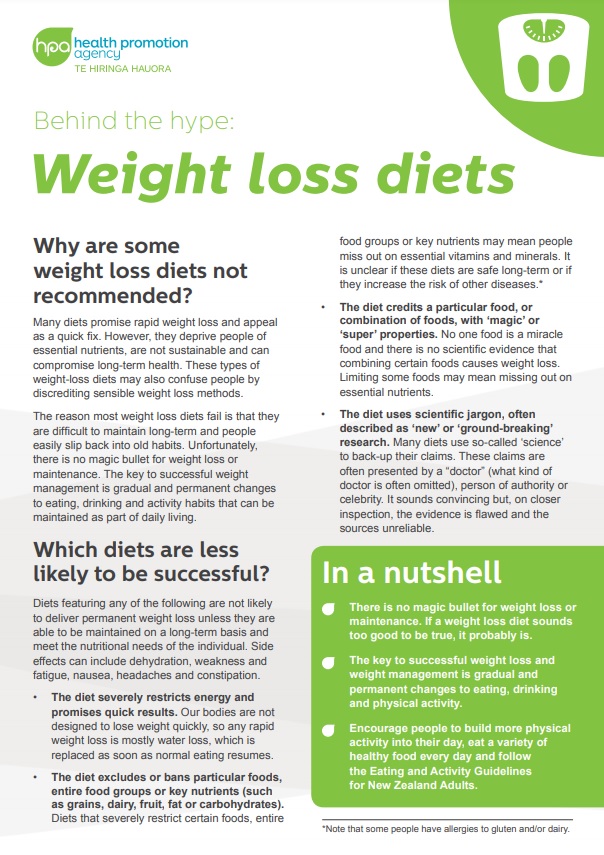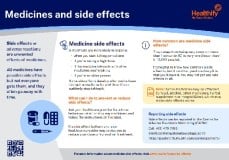Ongoing support when taking weight loss medicines
Ongoing support when taking weight loss medicines
- Weight loss medicines may be recommended to help support weight loss when lifestyle changes such as a healthy diet and increasing exercise are not helping on their own.
- The effects of weight loss medicines are not permanent and most people regain some or all of the weight once they stop taking the medicine.
- To maximise the benefits of weight loss medicines and to prevent weight regain, it's important to build long-lasting habits and receive ongoing support.

There are several weight loss medicines available in Aotearoa New Zealand. They may be recommended to help support weight loss when lifestyle changes such as a healthy diet, improving sleep habits and exercise are not helping on their own. You’ll only be prescribed a weight loss medicine by a health professional if you meet certain criteria based on your body mass index (BMI) and any other health conditions you may have. Read more about weight loss medicines.
While you are taking weight loss medicines, you will need to have regular visits to your healthcare provider who will check on your progress and monitor your health. Read more about screening and regular check-ups.
Weight loss medicines are not a ‘quick fix’ and their effects are not permanent. They should be seen as a tool to support lifestyle changes. If you lose weight by taking a weight loss medicine, it's likely that you will regain some or all of the weight you have lost when you stop taking it, especially with no lifestyle changes in place. Most of the weight you regain will be body fat which is harmful to your health. It can be helpful to have an understanding of weight loss and how to maintain healthy habits long term. Read more about understanding weight loss and developing long lasting eating habits.
If you stop taking the medicine, ongoing monitoring and support from your healthcare provider for at least one year is crucial to help you maintain any positive changes you have made. This may include support from a health coach, health improvement practitioner, nurse, doctor, dietitian, nutritionist or local weight management, exercise or support programme. It's important to continue with regular exercise for your overall health and to maintain your weight loss. Read more about increasing movement and physical activity.
You will also need to consider your mental wellbeing and have people around you that can support you. Read more about getting emotional and mental wellbeing support. Having a personalised plan tailored to your needs can be a helpful tool to support you on your weight loss journey. Find out how to have a personal care plan.
Weight cycling is the pattern of losing and regaining weight. This can happen after following different diets or different approaches to lose weight.
Instead of solely focusing on weight, it is best to think about your health and wellbeing as the priority and how you can develop long-lasting habits.
Several factors can impact your ability to lose weight including your age, starting weight, weight history, genetics, lifestyle, health conditions and how your body responds to the medicine.
- Age can slow down your metabolism, making it harder to lose weight.
- Hormonal changes like menopause can shift where you store body fat.
- Your starting weight and past weight changes can affect how your body responds to lifestyle changes.
- Genetics may mean your metabolism is slower, you feel hungry soon after eating or you are unable to feel full during a meal.
- Lifestyle choices, such as how active you are and what you eat and drink, make a big difference too.
- Health conditions such as thyroid problems or diabetes can affect weight, and some medicines may cause your body to gain or hold onto weight.
Weight loss can often slow or stabilise after several months as the body adapts, which means ongoing lifestyle changes are essential.
As you reach your weight loss goal, your nutrition needs will change so having the right support in place can help you maintain a healthy weight and prevent weight cycling in the long term.
If you're planning to stop the medicine or reduce the dose, talk to your healthcare provider around how you plan to maintain your weight loss and prevent significant weight regain.
Screening
Before you start taking a weight loss medicine it is important for your healthcare provider to check whether it is safe and suitable for you based on your health needs and weight history. Some people may not be suited to taking a weight loss medicine.
Regular checkups
Having regular checkups every few weeks to months with your healthcare team is important when you’re on any weight loss medicine. These visits help to monitor how well the medicine is working and to keep an eye out for any side effects or concerns.
- During these appointments, your healthcare provider will ask about any side effects and can adjust your medicines if needed to make it safer or more effective.
- Most weight loss medicines are started at a low dose and then gradually increased over several weeks. This helps your body adjust to the medicine slowly and reduces the chance of side effects like nausea (feeling sick), dizziness, or stomach upset.
- Some weight loss medicines may take a few weeks to start working. Usually, after about 12 weeks on a full dose, your healthcare provider will assess your weight loss. As a general guide, if you haven’t lost at least 5% of your body weight by then, it’s unlikely to be effective and other options may be considered instead.
- These checkups aren’t just about monitoring your medicines and weight loss. They are also to ensure your overall health and wellbeing is monitored and to discuss any changes you have been making to your eating, exercise and lifestyle.
- Your healthcare provider will also check other signs of improved health such as lower blood pressure, blood glucose and cholesterol levels.
A healthy and balanced approach to eating is important while taking weight loss medicines to maintain weight loss and prevent weight regain in the long-term.
Different medicines may change the way in which you eat food and may also change the foods you prefer and the way they taste.
If your appetite and food intake is affected it’s important to:
- manage side effects of the medicines that affect your ability to eat such as nausea, reflux, and getting the feeling of being full soon after eating (early satiety)
- maintain muscle with adequate protein
- get enough fluids
- achieve balance and variety in your diet
- eat regular meals (often smaller and more nutrient-dense)
- consider vitamin and mineral supplements with advice and monitoring from your health professional.
Creating new habits and making lifelong changes can be hard. It is best to see a registered dietitian or registered nutritionist to help you address challenges and barriers and eat in a way that meets your personal nutrition needs.
Regular physical activity is linked with long-term weight maintenance.
There are a variety of exercise types. It's important to work with your healthcare team to find ways of moving your body that work for you and that you can fit into your daily schedule.
Strength-based exercise
- Strength training such as weights, resistance bands, and bodyweight exercises helps to build and preserve muscle mass. When you lose weight, especially quickly, you risk losing muscle along with fat. Strength training helps you keep muscle, which keeps your metabolism higher and makes it easier to maintain weight loss after stopping the medicine.
Other types of exercise are also important
- Cardiovascular (cardio) or aerobic exercises such as brisk walking, cycling, and swimming burns calories and improves heart health. These exercises help to boost weight loss while on the medicine and improves stamina.
- Flexibility and balance exercises such as yoga, pilates and stretching help to improve mobility, posture, and reduce injury risk. They help you to stay active and consistent with other types of exercise.
While any activity is better than none, it's best to include strength, cardio and flexibility exercises. Relying only on cardio can lead to muscle loss, and skipping strength training can make long-term weight loss maintenance harder once you’re off the medicine.
Any approach to weight loss is more than just changing what you eat and how much you exercise. It requires an understanding of the factors that influence how you eat and your relationship with food.
It may involve working with your healthcare provider to understand your behaviours related to food and cravings. It may also involve understanding your triggers for emotional, mindless or late-night eating.
Your weight loss journey may also bring emotional highs and lows. You may feel happy and proud when you see progress, but other times you might feel frustrated, or upset if things don’t go as planned. Having the right people in your corner can make a big difference. It's important to reach out to family and friends who understand your goals and challenges, support groups (online or in-person) to share experiences, or mental health professionals who can help you with anxiety, depression, or body image concerns.
- The weight loss journey is different for everyone. It can be slow or uneven, and having someone to encourage you helps keep your spirits up and motivated.
- It's not unusual to have feelings of stress, anxiety, or frustration which can lead to mood swings, emotional eating or giving up. Support helps you handle these feelings in healthier ways.
- Some people find sharing their goals and progress with someone else helps keep them motivated to reach their goals.
- Support from friends, family and your healthcare provider can help you to build lifestyle habits that will last after the medicine has stopped.
Stopping weight loss medicines can be a challenging time. Many people regain some or all the weight they've lost which can lead to feelings of disappointment. You can feel like you’ve failed, even though some weight regain is expected.
A personalised plan is a guide made just for you, to help you improve your health and lose weight in a sustainable way. It usually includes steps tailored to your needs about what and when to eat, how to move your body to help you build long-lasting habits. It’s your own roadmap for weight loss and wellbeing, created with your healthcare team, that fits your body, health, and lifestyle.
Why a personalised plan is important
Having a plan when taking weight loss medicines is important because it helps you to stay healthy over time.
Having a plan can help you:
- set clear, realistic goals for how much weight you want to lose and by when
- monitor your progress and see what’s working and make changes if needed
- stay on track and manage challenges, especially when things get tough.
Review your plan
Sometimes life changes such as starting a new job, moving house, stressful periods or other life events may impact your lifestyle and routine.
It's important to review your plan with your healthcare team on a regular basis. With time, you may find that your approach to eating and exercise needs adjusting. Once you reach your goal weight or improved health, your focus will naturally move from losing weight to maintaining your weight loss. You might want to change your focus to building muscle, improving energy levels, or increasing your fitness instead.
Long-term plan
Since weight loss medicine is not a permanent solution, it's important to have a long-term plan, for when you stop the medicine. A long-term plan will include guidance on a maintenance strategy for eating and exercise and a plan if weight starts creeping back. It helps you get a clear understanding of how to maintain your health goals without only relying on medicine.
Brochures
Healthy eating, active living(external link) HealthEd, NZ, 2020
Behind the hype – weight loss diets(external link) Health Ed and Health Promotion Agency, NZ, 2019
5 questions to ask about your medications(external link) Health Quality and Safety Commission, NZ, 2019 English(external link), te reo Māori(external link)
Apps/tools
For healthcare providers
Weight management in adults(external link) Ministry of Health, NZ, 2018
References
- Quality standard: Overweight and obesity management(external link). National Institute for Health and Care Excellence (NICE). January 2025.
- Overweight and obesity management: the potential care journey(external link) NICE, 2025
- O'Dowd A. Patients coming off weight loss injections need support for at least a year, says NICE(external link). BMJ. 2025 Aug 5;390:r1646.
- Rogers RJ. Exercise for clients taking an anti-obesity medication.(external link) ACSMs Health Fit J. 2024 May-Jun;28(3):21-26.
- Jakicic JM, Rogers RJ, Church TS. Physical activity in the new era of antiobesity medications.(external link) Obesity (Silver Spring). 2024 Feb;32(2):234-236.
- Mozaffarian D et al. Nutritional priorities to support GLP-1 therapy for obesity: A joint Advisory from the American College of Lifestyle Medicine, the American Society for Nutrition, the Obesity Medicine Association, and The Obesity Society.(external link) Obesity (Silver Spring). 2025; 1-29.
Brochures

HealthEd, NZ, 2020

Health Ed and Health Promotion Agency, NZ, 2022

Medicines and side effects
Healthify He Puna Waiora, NZ, 2024
Credits: Sandra Ponen, Pharmacist, Healthify He Puna Waiora. Healthify is brought to you by Health Navigator Charitable Trust.
Reviewed by: Lily Henderson, Registered Dietitian
Last reviewed:





